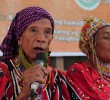THE 6th IISS ASIAN SECURITY SUMMIT
SHANGRI-LA DIALOGUE
Singapore
Sunday 3 June 2007
SECURING REGIONAL WATERS: HOW MUCH PROGRESS?
Hon Rohitha Bogollagama, Minister of Foreign Affairs, Sri Lanka
Rohitha Bogollagama
Minister of Foreign Affairs, Sri Lanka
It is indeed a great pleasure to be associated, representing Sri Lanka for the first time in the Shangri-La Dialogue. I must thank the Government of Singapore for the hospitality and all courtesies that have been extended to me and to my delegation.
I am looking forward to address this important session here in the Shangri-La Dialogue in terms of our own experiences in Sri Lanka in the context and from a Sri Lankan perspective in relation to Securing Regional Waters, How Much Progress?
Sri Lanka is an island state in the Indian Ocean and just 20 minutes from the international sea route, from the tip off Sri Lanka�s southern coast. So much of the traffic in terms of navigation traditionally takes place. We are on the east as much as on the west, surrounded by very important sea routes and navigational development.
We in Sri Lanka today experiences one of the threats both local and has a regional effect in terms of terrorism that has been affecting my country. It is in you in this session, Securing Regional Waters, How Much Progress, I trust it will be pertinent to present Sri Lanka�s perspective on maritime security in the region and its relevance to the world. This sea�s pertinence in Sri Lanka lies at the crossroads of Indian Ocean which lies in the midst of three continents. Today the world is menaced by terrorism, both global and regional. Most countries have had to deal with the scourge at some time or other, resulting in death and destruction, and for some of us it is a challenge that occurs daily.
In Sri Lanka unfortunately since 1975 we have to grapple with the Liberation Tigers of Tamil Eelam a ruthless, fascist organisation which seeks to carve out a separate mono-ethnic state by dismembering one third of the land mass and two-thirds of the country�s coastline. In the process the LTTE has left behind a trail of atrocities, amongst it some 65,000 victims are the Prime Minister Sri Rajiv Ghandi of India. President Ranasinghe Premadasa of Sri Lanka, as well as two generations of Tamil and similar politicians and academics of Sri Lanka including former Tamil United Liberation front leader A Amirthalingam, Tamil intellect and member of Parliament and constitutional expert Dr [Neelam Thurichelam?] and my own predecessor in office, former foreign minister Lakshman Kadirgamar whose only fault was their refusal geared to the tirade of the LTTE and abandon the democratic path.
Today the Tamil Committee, our Sri Lanka has been left without the moderate leaders due to the methodical process of elimination adopted by the LTTE during the past three decades. The LTTE state-of-the-art, international propaganda, fundraising, procurement and shipping network have been able to procure both war and war-related equipment. The organisation boasts of having maintained a vast global network since the mid 1980s with political propaganda officers and cells in some 54 countries.
It generates annual revenue of US$10-30 million per month gathered through extortion of the over 1 million strong Tamil diaspora and clandestine operations carried out in most countries including drug trafficking, money laundering, human smuggling and narcotics trading. However unlike most terrorist organisations in the world with proven maritime capability, LTTE own a substantial number of ships sailing across the oceans under the flags of different countries which alongside traditional trading activity engages in smuggling of military hardware. The LTTE has also established a naval combat unit known as the �Sea Tigers�.
Thus Sri Lanka confronts what terrorism expert and chief scientist at the Centre for Asymmetric Threat Studies at the Swedish National Defence College, Dr Magnus Ranstorp, has described best. LTTE is probably the most sophisticated terrorist organisation in the world.










